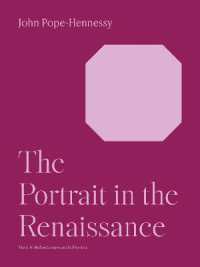基本説明
This volume is dedicated to the implications and consequences of the almost exclusive use of English as the language of scientific communication. The choice of English is usually seen as "natural" or at least "unavoidable", without considering that it could involve problems and be inequitable. This volume of AILA Review presents and discusses this phenomenon and its social implications with the support of a number of internationally known authors who outline its scientific relevance and put forward various options of language policy.
Full Description
This volume is dedicated to the implications and consequences of the almost exclusive use of English as the language of scientific communication. While until the end of the Seventies of the last century, scientific communication was characterized by a high degree of shared multilingualism, a drastic change towards English monolingualism has taken place from the beginning of the Eighties, at first in the so-called hard sciences (natural sciences, medicine, technology, and mathematics) - under the threat of the 'bibliometric measurement' via the impact factor - and gradually also, though still to a lesser extent, in the social sciences and humanities. The choice of English is usually seen as "natural" or at least "unavoidable", without considering that it could involve problems and be inequitable. This volume of AILA Review presents and discusses this phenomenon and its social implications with the support of a number of internationally known authors who outline its scientific relevance and put forward various options of language policy.
Contents
1. Introduction to the topic (by Carli, Augusto); 2. Articles; 3. English monolingualism in scientific communication and progress in science, good or bad? (by Coulmas, Florian); 4. The non-Anglophone scholar on the periphery of scholarly publication (by Flowerdew, John); 5. Stereotypes about English as the language of science (by Guardiano, Cristina); 6. The dominance of English in the international scientific periodical literature and the future of language use in science (by Hamel, Rainer Enrique); 7. Tackling the Anglophones' free ride: Fair linguistic cooperation with a global lingua franca (by Parijs, Philippe Van); 8. Assessing efficiency and fairness in multilingual communication: Towards a general analytical framework (by Gazzola, Michele); 9. Shift in language policy in Malaysia: Unravelling reasons for change, conflict and compromise in mother-tongue education (by Gill, Saran Kaur); 10. Discussion; 11. Global scientific communication: Open questions and policy suggestions (by Ammon, Ulrich)








